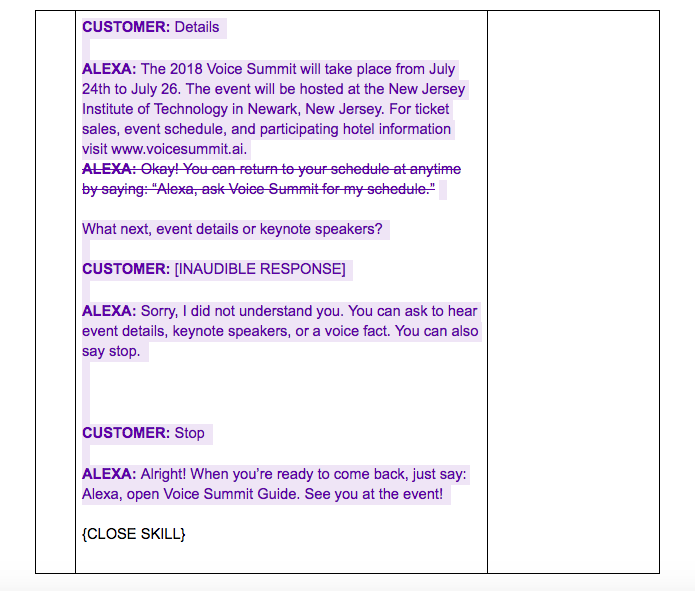Please note, detailed processes such as complete scripts, user flows, usability tests, and demos, as well as work with Witlingo clients are currently protected under an NDA.
Voice Summit Guide (Alexa Skill)
You can enable the skill here by asking Alexa to enable Voice Summit Guide, or go here to learn more: https://www.amazon.com/ModevJake-Voice-Summit-Guide/dp/B07BDCHFSH or see a demo of the skill.
How We Built It
We met with MODEV to start the concept for the redesign of the Voice Summit Guide. We wanted to design a skill that would do the following:
- Allow attendees to hear voice-first tips from actual event speakers
- Provide statistics on the growth of the Voice market
- Provide basic event information
- Let users see images of the speakers on Alexa cards
It had to be completed and certified in three months, in time for the event launch. The design, of course, had to take into account what I call "unhappy paths," or error management (e.g., silence, misunderstood requests, system errors etc.)
The Process
After initial conversations with the stakeholder MODEV, I created the first initial MVP script. This script would allow users:
- To hear from a specific presenter
- Learn about workshop details
- Add certain workshops to their schedule
- Hear voice stats
- Hear event details
There were a couple of concerns with this design:
- We were entirely dependent on whether or not MODEV could provide a finalized workshop schedule.
- We were not sure how many speaker recordings we would receive. Let's say that a user asked for Cathy Perl, because we do not have a recording from her, a user would have been frustrated.
- The capacity to provide an individualized user-scheduler would require a database, and we did not want to deal with database issues, access to the database etc.
- MODEV was initially unresponsive - delaying our process, and cutting our time down to one-month.
On to the second iteration...
In this iteration - we discovered that we had less time to build an MVP. What we decided to do was launch a skill that would simply allow for the speaker recordings we could have - removing complexity.
At this point:
- We (as a team this time) created a new, simplified script w/atmospherics
- I started the process of collecting recordings, images, and cleaning all artifacts for presentation
- I prompted the developer to start creating a demo.
- As a team, we tested and presented the demo to MODEV.
- We made small alterations to the script.
- Development on the final design started
- I performed internal QA.
- I performed small sets of Usability Tests (closed-loop with people we knew).
- We then resolved the small issues discovered during testing.
- Deployed and Certified the skill.
Post-Deployment
One of the things we discovered is that we had to expand our utterances list, because our first initial review came from a user who tried to access the recordings using an utterance that was not accepted. This was a lesson-learned, and so we spent a day expanding the utterances, and launched a new iteration.

